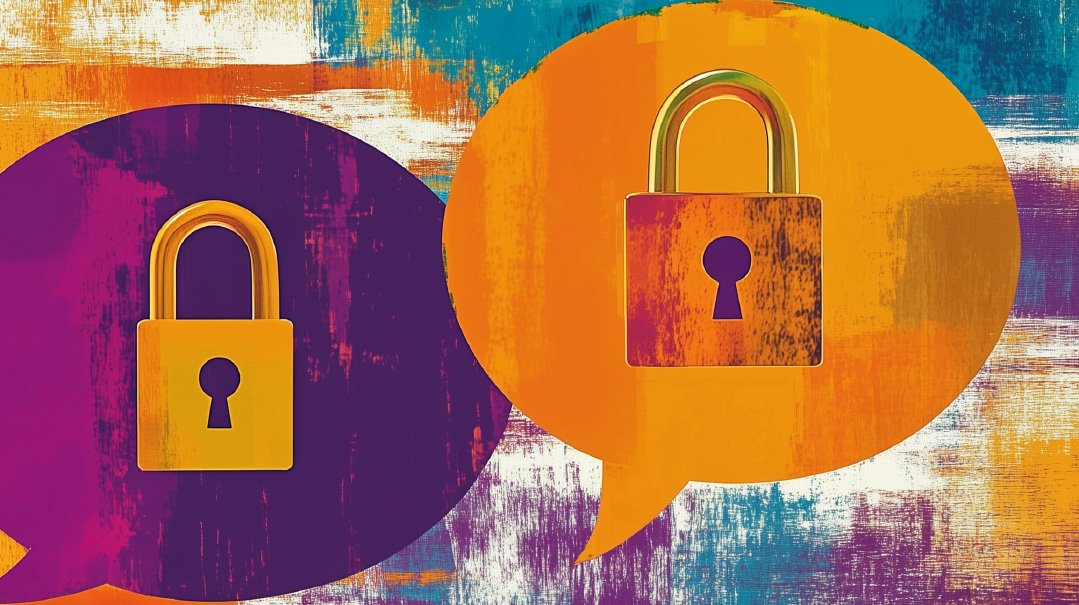Top Secret

When is it okay to tell and when is it not?

Prepared for print by Faigy Peritzman
M
y aunt was recently niftar, and as her only living relative, I’ve been cleaning out her home and came across her personal diary. Is it permitted to read such personal thoughts after someone has passed away?
If it contains just personal thoughts and random information, there is no reason why it can’t be read. But if you suspect that it may contain material which your aunt would have wanted to keep secret, then it’s forbidden — according to Rav Chaim Kanievsky — to reveal a deceased person’s secrets.
My sister shared details about a medical issue with me, which I’m assuming she wants confidential. Does this mean I may not share it with my husband as well?
Instead of assuming, you can just ask her if it’s okay for you to share the information with your husband. If you can’t ask her, you can assume she meant to include your husband as well.
My in-laws recently shared some financial details with my husband and insisted he keep it from me, even though it does affect me. Invariably I found out, and I’m so hurt that he kept this from me. Isn’t my perspective more important for my husband to honor than my in-laws’?
Yes, your husband should have shared that information with you, despite the fact that his parents would have objected. Husbands [or wives] who deliberately withhold significant and relevant information from their spouse will most definitely inflict damage on their marriage.
When I was in high school, my close friend shared with me a medical issue she deals with, insisting it remain a secret between us. Now, we’re both in shidduchim, and I’m on her résumé for people to call about her, but I don’t how I should answer this question if asked.
Discuss with your friend what she wants you to say when people call to ask about her. Tell her that if you’re asked a direct question about her health, in which case you must tell the truth, then you will have no choice but to reveal her medical condition. If your friend objects to your exposing her condition, ask for your name to be removed from her résumé.
My close friend shared with me something very heavy that she’s dealing with that obviously must remain a secret. However, I’m having a hard time processing this and holding this information. For my own sake, am I permitted to discuss my feelings with a rav or therapist, even though she wanted it confidential?
Based on the pasuk in Mishlei where Shlomo Hamelech advises one who is suffering from anxiety or agitation to share his concern and apprehension with others, the Chofetz Chaim permits sharing private information, even negative information, as long as your purpose is therapeutic, to alleviate your anxiety or fear. Obviously, one may not exaggerate the facts of the story. In addition, the person who is listening to the information being shared may not accept and believe that what you’re saying is an absolute fact; he or she can only accept that this is your understanding of the situation, but it may or may not be the truth.
My boss recently asked me about a potential hire that lives in my neighborhood. I personally know something about this person that most people don’t, and it would be to the boss’s benefit to know this. Am I allowed to tell him? Must I tell him?
If that piece of information is something that could negatively affect that person’s job performance, which would then impact the business, then you’re required to share that information with your boss. Not doing so transgresses the min HaTorah prohibition of “lo sa’amod al dam reaicha,” loosely translated as “do not stand idly while your fellow’s blood is being shed.” If, however, that information will not affect your boss’s business, then you’re not required to offer that information, but you’re allowed to share it if your boss asks you directly about it.
My son recently got in trouble with his rebbi, and I had to go down to the cheder to work things out. After meeting with the teacher and the principal, my child was allowed back in class. As I said goodbye to him, he whispered, “Don’t tell Abba about this, okay?” Do I honor my son’s request for secrecy or my husband’s honor as an involved father?
You’re by no means required to listen to a child’s instructions to you (parents should be giving instructions to their children, not the other way around), which means that you’re allowed to share the information with your husband. The real question here is whether or not you should share this information with your husband. In other words, you must determine if your husband’s knowledge of this episode will be beneficial to your child or the opposite. If you’re not sure, discuss it with your son’s rebbi or principal.
My parents are aging, and we siblings are trying to keep things from them that would worry them. However, on the occasion that they somehow find out anyway, they’re hurt that we kept his information from them. Still, we feel we’re protecting them from pain and worry. What’s the better way to mechabed them?
In general, if the parents will be hurt or insulted if information is kept from them, then it’s disrespectful to keep them in the dark and therefore a violation of kibbud horim. There are, however, numerous exceptions to this general rule, so each specific situation needs to be independently determined.
When I send an email or text, I assume it’s for the recipient only and would not be forwarded without my consent. However, I’ve been hurt several times by people sharing this information, and then saying that it’s considered the norm that emails or texts aren’t considered private. Is that halachically true?
If you don’t want your email or text to be forwarded or shared, make sure you specifically state that in your communication. Otherwise, there’s a reasonable chance that your information will be forwarded or shared with others, and you can’t blame the recipient for doing so.
My husband rarely uses our computer, but when he does have a need to send an email, he uses my account. I feel exposed and vulnerable that he has access to my personal correspondence with friends and relatives, but he seems to feel there’s no issue because we’re married. Who is correct?
It’s reasonable for a wife to object to her husband having access to her personal correspondences. Being married doesn’t mean there’s no private space between you and your spouse. If after explaining this to your husband, he adamantly refuses to allow you privacy in this area, there’s something deeper going on in the marriage that needs to be addressed.
This is my first year back from seminary, and baruch Hashem, a lot of my friends are getting engaged. I’ve been wondering (and I’m guilty of this as well) if it’s permitted to share an “unofficial engagement,” as close friends sometimes do.
Unless you have permission from the kallah or her family, it’s not permitted to share “unofficial engagements” until they become official, and doing so can sometimes cause great damage.
(Originally featured in Family First, Issue 942)
Oops! We could not locate your form.













